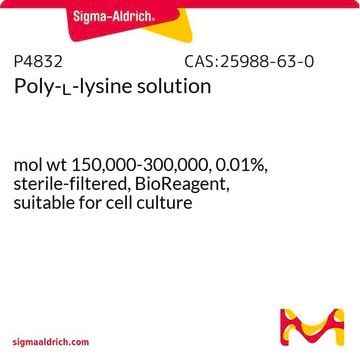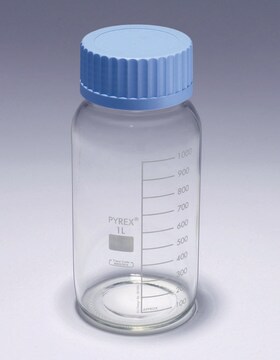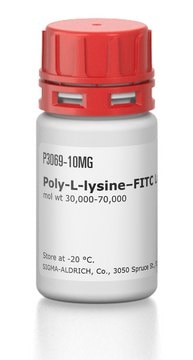P9155
Poly-ʟ-Lysine Hydrobromide
synthetic, mol wt 30,000-70,000, powder, γ-irradiated, suitable for cell culture, BioXtra
Szinonimák:
PDL HBr
About This Item
Javasolt termékek
product name
Poly-L-lysine hydrobromide, mol wt 30,000-70,000, lyophilized powder, γ-irradiated, BioXtra, suitable for cell culture
biológiai forrás
synthetic (organic)
Minőségi szint
sterilitás
γ-irradiated
termékcsalád
BioXtra
form
lyophilized powder
molekulatömeg
30,000-70,000
kiszerelés
pkg of 5 mg
technika/technikák
cell culture | mammalian: suitable
felület bevonatolás
4 μg/cm2
oldhatóság
H2O: soluble 50 mg/mL, clear, colorless
kiszállítva
ambient
tárolási hőmérséklet
−20°C
SMILES string
Cl.NCCCCC(N)C(O)=O
InChI
1S/C18H38N6O4/c19-10-4-1-7-13(22)16(25)23-14(8-2-5-11-20)17(26)24-15(18(27)28)9-3-6-12-21/h13-15H,1-12,19-22H2,(H,23,25)(H,24,26)(H,27,28)/t13-,14-,15-/m0/s1
Nemzetközi kémiai azonosító kulcs
WBSCNDJQPKSPII-KKUMJFAQSA-N
Looking for similar products? Látogasson el ide Útmutató a termékösszehasonlításhoz
Általános leírás
Alkalmazás
Poly-L-lysine hydrobromide has been used to adhere the dissociated cells of cortical tissues into the culture plates. It has also been used to treat slides, to fix samples on it for immunohistochemical analysis.
Biokémiai/fiziológiai hatások
Komponensek
Vigyázat
Analízis megjegyzés
Egyéb megjegyzések
Tárolási osztály kódja
11 - Combustible Solids
WGK
WGK 3
Lobbanási pont (F)
Not applicable
Lobbanási pont (C)
Not applicable
Egyéni védőeszköz
Eyeshields, Gloves, type N95 (US)
Analitikai tanúsítványok (COA)
Analitikai tanúsítványok (COA) keresése a termék sarzs-/tételszámának megadásával. A sarzs- és tételszámok a termék címkéjén találhatók, a „Lot” vagy „Batch” szavak után.
Már rendelkezik ezzel a termékkel?
Az Ön által nemrégiben megvásárolt termékekre vonatkozó dokumentumokat a Dokumentumtárban találja.
Az ügyfelek ezeket is megtekintették
Cikkek
Poly-Lysine enhances cell binding with positively-charged surface ions, optimizing electrostatic interaction on culture surfaces for increased cell attachment.
Extracellular matrix proteins such as laminin, collagen, and fibronectin can be used as cell attachment substrates in cell culture.
Cancer stem cell media, spheroid plates and cancer stem cell markers to culture and characterize CSC populations.
Protocols
Adhere cells to solid substrates using poly-lysine, which enhances electrostatic interaction between negatively charged ions of the cell membrane and the culture surface.
Tudóscsoportunk valamennyi kutatási területen rendelkezik tapasztalattal, beleértve az élettudományt, az anyagtudományt, a kémiai szintézist, a kromatográfiát, az analitikát és még sok más területet.
Lépjen kapcsolatba a szaktanácsadással









